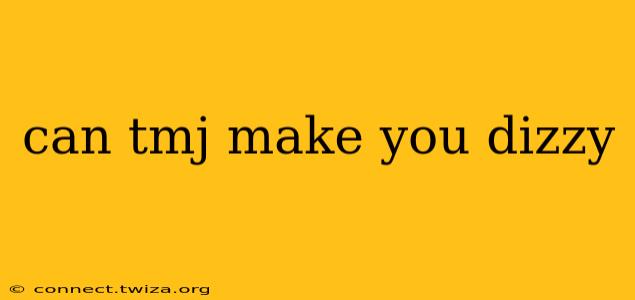Temporomandibular joint (TMJ) disorders, affecting the jaw joint and surrounding muscles, can cause a surprisingly wide range of symptoms. While jaw pain and clicking are common, many sufferers also experience dizziness. But is there a direct link, and if so, how does it work? This article explores the connection between TMJ and dizziness, answering common questions and providing valuable insights into this often-overlooked symptom.
What is TMJ?
Before delving into the dizziness connection, it's crucial to understand TMJ disorders. TMJ refers to the two joints connecting your jaw to your skull, one on each side. These complex joints enable chewing, talking, and yawning. When these joints become inflamed or misaligned, it leads to TMJ disorder, characterized by symptoms like:
- Jaw pain: This can range from mild discomfort to severe, debilitating pain.
- Clicking or popping in the jaw: A common sign of joint dysfunction.
- Limited jaw movement: Difficulty opening or closing your mouth fully.
- Headaches: Often located in the temples or sides of the head.
- Earaches: Pain or discomfort in the ear.
- Facial pain: Pain in the face, particularly around the jawline.
Can TMJ Cause Dizziness? The Potential Connection
Yes, TMJ can contribute to dizziness. While not a direct, universally experienced symptom, the intricate network of nerves and muscles in the head and neck region provides a plausible mechanism. The connection is often indirect and may involve:
-
Vertebrobasilar Insufficiency (VBI): This condition affects blood flow to the brain stem, potentially causing dizziness, vertigo, and other neurological symptoms. Misalignment of the jaw due to TMJ can sometimes contribute to VBI by subtly affecting the positioning of the neck and blood vessels.
-
Nerve Compression: The many nerves in the head and neck are interconnected. TMJ problems can compress or irritate these nerves, potentially leading to dizziness and other sensory disturbances.
-
Muscle Tension: Chronic jaw muscle tension, a common TMJ symptom, can also spread to neck muscles, causing imbalances and potentially affecting the vestibular system (responsible for balance), leading to dizziness.
-
Inner Ear Issues: Some studies suggest a potential link between TMJ dysfunction and inner ear problems, although more research is needed to confirm this conclusively. The close proximity of the jaw joint to the inner ear structures suggests a possible pathway for influence.
What are the symptoms of TMJ-related dizziness?
TMJ-related dizziness can manifest in various ways. You might experience:
- Vertigo: A sensation of spinning or whirling, often associated with nausea and vomiting.
- Lightheadedness: A feeling of faintness or unsteadiness.
- Imbalance: Difficulty maintaining balance or coordination.
- Dizziness that worsens with jaw movement: This is a strong indicator of a potential TMJ-dizziness link.
How is TMJ-related dizziness diagnosed?
Diagnosing TMJ-related dizziness requires a thorough examination. Your doctor will likely assess your jaw joint, check for muscle tenderness, and inquire about your symptoms. They might recommend imaging tests (like X-rays or MRI) to rule out other conditions. A referral to an ENT specialist or neurologist may also be necessary to fully evaluate the dizziness.
How is TMJ-related dizziness treated?
Treatment focuses on addressing the underlying TMJ disorder and managing the dizziness. Options include:
- Physical therapy: Exercises to improve jaw mobility and strengthen surrounding muscles.
- Medication: Pain relievers, muscle relaxants, or anti-inflammatory drugs may be prescribed.
- Splints or mouthguards: These appliances help to realign the jaw and reduce muscle tension.
- Lifestyle changes: Improving posture, managing stress, and adopting a healthier diet can help.
Can stress cause both TMJ and dizziness?
Stress can indeed exacerbate both TMJ disorders and dizziness. Stress often leads to clenching or grinding of the teeth (bruxism), a major contributor to TMJ pain. Additionally, stress can disrupt the body's equilibrium, causing or worsening dizziness. Managing stress through techniques like yoga, meditation, or therapy is crucial for managing both conditions.
When should I seek medical attention for TMJ and dizziness?
Seek immediate medical attention if your dizziness is severe, accompanied by other neurological symptoms (like weakness, numbness, or vision changes), or if you experience sudden, intense jaw pain. Regular medical check-ups and open communication with your doctor are essential for managing both TMJ and dizziness effectively. Do not self-diagnose; a professional assessment is necessary for appropriate diagnosis and treatment.
